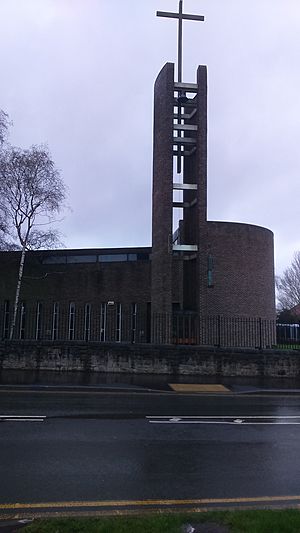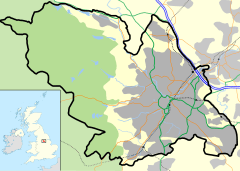St Catherine of Siena, Richmond facts for kids
Quick facts for kids St Catherine of Siena, Richmond |
|
|---|---|

St Catherine of Siena, seen from the south east
|
|
| Religion | |
| Affiliation | Anglican |
| District | Diocese of Sheffield |
| Province | York |
| Ecclesiastical or organizational status | Church |
| Leadership | Philip Knowles (priest) |
| Year consecrated | 1959 |
| Location | |
| Location | Richmond, Sheffield South Yorkshire, England |
| Architecture | |
| Architect(s) | Basil Spence |
| Architectural type | Church |
| Architectural style | Modernist |
| Completed | 1959 |
| Construction cost | £50000 (£840,000 in 2021) |
| Specifications | |
| Capacity | 300 |
| Length | 99 feet |
| Width | 42 feet |
| Height (max) | 56 feet |
| Materials | Brick |
St Catherine of Siena is an Anglican church located in the Richmond area of Sheffield, England. It is a place where people of the Anglican faith gather for worship.
Contents
How the Church Started
Richmond used to be a quiet area with few people. It was part of the larger Handsworth parish. In the 1930s, many new homes were built in the Woodthorpe estate. To serve the people living there, a small, temporary church was built in 1935. This building was made of corrugated asbestos.
By 1949, the number of people in the area had grown to over 10,000. The small church was no longer big enough. A new, permanent church was clearly needed. Frederick Etchells, an architect, was asked to design a new church that could hold 500 people. However, there was no money to build it at first.
Designing the New Church
During World War II, St Phillip's Church in Attercliffe was destroyed by bombs. The church received money to help rebuild it. However, fewer people lived in Attercliffe after the war. So, the Diocese of Sheffield (a church district) asked if this money could be used for the new church in Woodthorpe instead. Everyone agreed.
Frederick Etchells was asked to update his plans, but he had mostly retired. So, Basil Spence, another architect, took on the job. At first, he designed a church similar to one he had built in Leicester. But in 1957, he completely changed his plans. He worked with Anthony Blee, who drew the detailed pictures of the church's sides.
The new design was for a brick church. It included a hall, a bell tower connected by a glass walkway, and a separate house for the vicar (the church leader). The church looked quite simple, with tall, narrow windows. Its style was inspired by other modern churches, like one in Minneapolis, USA.
Building and Opening the Church
Construction of the new church began on the same spot where the old temporary church stood. By April 1959, the building was well underway. The Bishop of Sheffield and the Earl of Scarborough officially dedicated the foundation stone. This stone is usually placed at the start of a building project.
Just before the church opened, Ralph Beyer carved the church's name by the doorway. St Catherine of Siena officially opened on December 5, 1959. After it opened, the church's parish was renamed Richmond, because it covered the larger Richmond area. For many years, the church had smaller groups of worshippers than expected. This was because many local people were either Catholic or Methodist.
Inside the church, the altar (the table used for services) is made of black metal with a wooden top. The font (a basin for baptisms) is made of limestone with fossils in it. More decorations and furnishings were added over the next few years. An organ was installed, and a sculpture by Ronald Pope was added to the bell tower in 1966.
Recent Times
In the late 1980s, more people started attending the church. This happened as new families moved into the area. A big restoration project was finished in 1997. After this, the church was given a special status called Grade II listed. This means it is an important historical building that needs to be protected.
The church follows a "Catholic style" of worship, which means it has certain traditions. It does not support the idea of women becoming priests. Because of this, it has chosen to be overseen by the Provincial episcopal visitor, who is currently the Bishop of Beverley.
 | DeHart Hubbard |
 | Wilma Rudolph |
 | Jesse Owens |
 | Jackie Joyner-Kersee |
 | Major Taylor |


